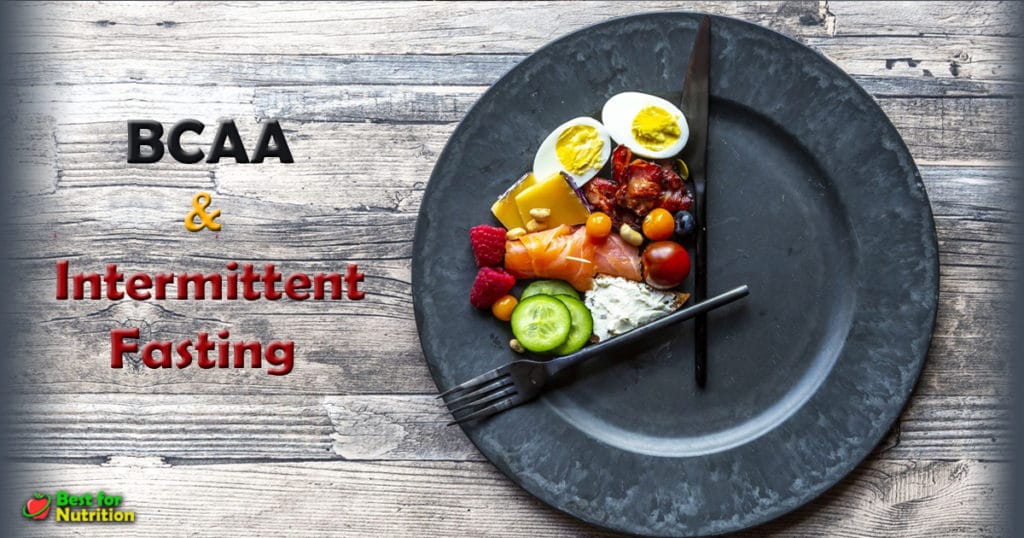Intermittent fasting is a popular and trending weight-loss method followed by millions of people around the globe.
When it comes to reasons such as weight loss and muscle buildup, intermittent fasting has superseded fasting, not as a diet, but more as a planned manner of eating. But what is the link between intermittent fasting and BCAAs?
A widely popular supplement used to prevent muscle breakdown and recovery post-workouts, BCAAs role, and efficiency is now being explored in areas of intermittent fasting.
Can BCAA be used in intermittent fasting? Will the BCAA intake break the fast?
Read on to know more about intermittent fasting, the role of BCAAs in intermittent fasting, and the benefits.
- What is Intermittent Fasting
- Does BCAA Break a Fast?
- Using BCAAs With Exercise During Intermittent Fasting
- Can BCAA in Intermittent Fasting Cause an Insulin Spike?
- Benefits of Taking BCAAs During Intermittent Fasting

What is Intermittent Fasting (IF)?
Fasting is a practice followed right from the Stone Ages when people had to forage for food and went without nothing for certain periods.
Modern Age has seen fasting and intermittent fasting evolve into ritualistic procedures, often religious or for very specific reasons such as cleansing, weight loss, etc.
Intermittent fasting follows a periodic cycle that alternates between eating and fasting. The eating pattern focuses more on the timing of food intake rather than what foods one consumes.
Intermittent fasting can be followed in 3 variations.
- A 16:8 hour fast every day, where you fast for 16 hours and eat as you like for 8 hours. This type is more beneficial for athletes who are involved in regular workouts. (1)
- The second is a 5:2 day fast, involving 2 non-consecutive fasting days and 5 normal eating days. (2)
- The final one is implementing a 0-25% calorie restriction on alternate days, throughout the week. (3)
All 3 types of fasting aim to control calorie consumption and create a fasting window to make the body use fat rather than carbs as a fuel source.
Intermittent fasting works based on the fact that the human body needs glycogen for energy. Since carb availability is less owing to calorie restriction and an appropriate fasting window, the body starts using fat as fuel.
Combined with exercise, intermittent fasting works as an effective tool for weight loss.
Research indicates that intermittent fasting has the potential to reduce fat mass and improve certain lipid markers that can make it a choice for a healthy lifestyle. (4)
Summary: Intermittent fasting involves using an alternating pattern of eating and fasting. All three types of intermittent fasting aim to lower calorie consumption, making the body resort to fat as fuel for energy.
Does BCAA Break a Fast?
Fasting can refer to different metabolic statuses such as overnight fast or wilful abstinence from food(s) for certain periods, either for medical or religious reasons.
Intermittent fasting is done primarily to lose weight and/ or to gain lean muscle, with a timed window between eating and fasting.
BCAAs (Branched-chain amino acids) are 3 essential amino acids that are important for the body’s protein synthesis and other physiological functions.
So, do BCAAs break a fast? Well, the answer would be Yes!
A fast is assumed broken when you consume something with calorific value and that in turn has an impact on insulin response in the body.
Apart from carbs, proteins are also a source of calorific energy. Since BCAAs are small units of proteins, technically, taking BCAAs would mean you are breaking a fast. (5)
Taking BCAAs does not downgrade the effect of fasting but instead increases the efficacy of the fasting routine.
Summary: Fasting and intermittent fasting are usually done for specific reasons. BCAA consumption being small amounts of protein provides energy and does break a fast, but in a more beneficial manner.
Using BCAAs With Exercise During Intermittent Fasting
Exercise and intermittent fasting make for a great combo to gain some lean muscle. And, this is where you need the BCAAs. Why?
Intermittent fasting implies an extended window period between fasting and eating times. And, exercising in the fasting period can mean more difficulty in retaining energy and stamina.
During exercise on an empty stomach in the fasting period, the body uses the fat stores and breaks down proteins too, for energy. While the burning of excess fat stores is healthy, protein losses can affect the entire functioning of the body.
Quick replenishing of proteins is easily accomplished with the use of BCAAs. BCAA fasted training may be more effective due to the timely nourishment of amino acids.
Taking BCAA both prior and after your workouts, ensures you retain the fasting window to the maximum benefit. BCAA fasted training may also ensure better endurance, lower muscle damage, and increased lean muscle content while retaining fat loss. (6), (7)
Summary: Exercise during intermittent fasting can lead to both weight loss and lean muscle growth. To avoid protein losses, BCAAs may be used to replenish protein stores and promote endurance in fasted-training periods.
Can BCAA in Intermittent Fasting Cause an Insulin Spike?
The primary intention of Intermittent fasting is to abstain from foods that cause insulin spikes during the fasting period. This results in ketosis, a metabolic state, where the body starts using fat resources for energy production.
Carbs are the highest contributors to insulin spikes but proteins do their bit too. Since BCAAs are essentially proteins, they do cause an insulin response.
But studies have shown that the response is insignificant and did not affect glucose levels predominantly. (8)
This means that BCCA consumption does invoke an insulin response but does not cause spikes or halt ketosis in the body, which is a huge advantage during intermittent fasting.
Summary: Intermittent fasting focuses on limiting the consumption of certain foods to avoid insulin spikes and promote ketosis. Although the intake of BCCAs in fasting evokes an insulin response, it is insignificant to halt ketosis.
Benefits of Taking BCAAs During Intermittent Fasting (IF)
BCAAs are generally consumed by athletes as supplements to support muscle recovery after intensive workouts.
Combined with exercise and intake of BCAAs, intermittent fasting (IF) can provide multiple benefits some of which are explained in this segment.
BCAAs in IF Can Promote Weight Loss
BCCAs supply important amino acids which can be vital during a period such as intermittent fasting.
Intermittent fasting focuses on longer fasting windows without the use of carbs, so that fat reserves in the body are used to promote weight loss.
When combined with exercise, the body also uses proteins which results in protein depletion. BCAAs effectively bridges these protein gaps so that the body can continue to burn fat to promote effective weight loss. (9)
Studies have shown that exercising in a fasted state can promote fat loss and BCAAs help with preserving lean muscle mass, an outcome of well-planned weight loss. (10), (11)
Apart from the achieved fat loss, continued BCAA fasting, also helps in laying-off future fat accumulation that is vital for weight management.
Summary: Intermittent fasting aims to use up fat reserves for weight loss. Exercising during this period can end in protein depletion. BCAAs consumption during intermittent fasting can bridge the protein gaps and promote lean muscle mass along with fat loss.
BCAAs During Exercise in IF may Increase Lean Muscle Growth
Intermittent fasting combined with exercise is a great way to achieve fat loss and in the process build lean muscle mass.
But when you do engage in rigorous workouts and not have food, you deprive your muscles of the BCCAs sourced from your diet intake to initiate recovery.
Studies have shown that BCAAs are vital for muscle growth which makes it a valuable addition during intermittent fasting. (12)
Another study suggested that leucine is the most significant among the 3 BCAAs to stimulate protein synthesis in skeletal muscle. (13)
Consumption of BCAAs before and after workouts may help prevent muscle damage and promote muscle growth and recovery.
Summary: BCAAs can lend support to the body during times of exercise in intermittent fasting. Studies prove BCAAs especially leucine’s efficiency to stimulate protein synthesis and aid muscle growth.
BCAA Intake During IF may Help Lower Fatigue
Fatigue is a common issue faced during fasting, more so when combined with exercise. Fatigue can be classified into peripheral fatigue and central fatigue.
Research has revealed that BCCAs can be effective in relieving both muscle and mental fatigue.
Peripheral fatigue can occur in muscles when intense workouts are carried out without the adequate compensation of nutrients to the muscles. (14)
BCAA intake during fasted training can effectively replace the required amino acids to avoid muscle fatigue from setting in. (15)
Central fatigue can set in when there is both physical and mental stress on the Central Nervous System (CNS). This is also a strong possibility when exercise is combined with intermittent fasting.
Again, BCAA intake can help relieve central fatigue. Studies have shown that BCCAs can help relieve mental fatigue during exercise and enhance cognitive performance after exercise. (16)
Summary: Fatigue is one of the common after-effects of fasted training. BCAA consumption during fasted training can help mitigate both peripheral and central fatigue and enhance performance.
BCAA Intake Boosts Fasted Cardio During IF
BCAA fasted training can include fasted cardio exercises for reaping the benefits of intermittent fasting.
Fasted cardio is done with the chief intention of burning fat for weight management. Research too shows that higher fat loss is achieved when cardio is done in the fasted state. (17)
Fasted cardio workouts can lack energy in intermittent fasting owing to calorie restriction, resulting in fatigue. BCAAs consumption can offset that by providing the required amino acids for the body.
Also, fasted training exercise induces BCAA catabolism, which makes BCAA intake necessary to build lean muscle. (18)
Summary: Fasted training may include cardio exercise for effective fat burning. Cardio exercises in intermittent fasting promote BCAA breakdown, necessitating BCAA intake to build lean muscle mass.
BCAAs May Alleviate Muscle Soreness After Exercise During IF
Intense exercise during intermittent fasting can likely result in muscle damage and soreness. Quick recovery may be possible with the use of BCAAs before and/ or after exercises.
Amino acids, especially BCAAs are powerful enough to help relieve muscle soreness that sets in after exercise. (19)
Studies also showed that BCAA supplementation before exercises may help reduce the extent of muscle damage and soreness. (20)
Another study showed that BCAAs before squat exercises may provide relief from Delayed-Onset Muscle Soreness that occurs usually a day after exercises. (21)
BCAA consumption may thus promote fast recovery from muscle damage and soreness and improve the body’s capability to handle fasted training effectively.
Summary: Muscle damage and soreness can occur in fasted training. BCAA being sources of amino acids can hasten recovery from such conditions to help continue and benefit from intermittent fasting.
BCAAS may Support IF and Enhance the Immune System through Autophagy
The human body is unique and is capable of renewing itself when required. This process of cellular renewal, called Autophagy, occurs after a fasting period.
Autophagy is a healthy way of body renewal where old, unnecessary, or diseased cells are destroyed to allow the formation of new, active cells that pave the way for a stronger immune system.
The mechanism of autophagy was discovered by Yoshinori Ohsumi who won the Nobel Prize in Physiology/ Medicine for it in 2016. (22)
Research says that short-term fasting can induce autophagy. (23)
Another study indicated that Time-Restricted Feeding (TRF), a form of intermittent fasting, can improve glucose levels, lipid metabolism, circadian rhythm, increase autophagy, and have anti-aging effects in humans. (24)
So, does BCAA intake help autophagy? One particular study on cancer indicated that BCAAs may suppress insulin-induced proliferation of human colorectal tumor cells by inducing autophagy. (25)
Summary: Discovered by Yoshinori Ohsumi, autophagy is a cell renewal process that occurs in the body following a fasting period. BCAA intake during intermittent fasting may induce autophagy.
The Final Note
Intermittent fasting is a cyclic pattern that involves fasting and eating in turns. With a focus on the restriction of calories, fasted training is more effective with BCAA supplementation to burn fat and induce weight loss.
BCAA are proteins that provide small doses of energy, that would mean breaking a fast but in a beneficial manner.
Though the intake of BCAAs evokes an insulin response, it is quite insignificant to spike glucose levels or interfere with the fat-burning process.
Exercise during intermittent fasting may deplete proteins which are effectively replaced through BCAA supplementation.
BCAA intake during intermittent fasting provides multiple benefits that include visible weight loss, increased lean muscle growth, lowered fatigue, and muscle soreness.
Inclusion of BCAAs before and after workouts ensure that BCAA fasted training is optimized to bring out the best benefits of intermittent fasting.





